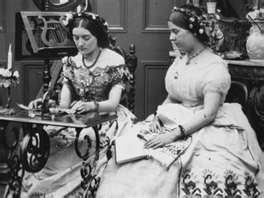My So-Called Life as a Proverbs 31 Wife
September 13th, 2011 It is time for a FIRST Wild Card Tour book review! If you wish to join the FIRST blog alliance, just click the button. We are a group of reviewers who tour Christian books. A Wild Card post includes a brief bio of the author and a full chapter from each book toured. The reason it is called a FIRST Wild Card Tour is that you never know if the book will be fiction, non~fiction, for young, or for old…or for somewhere in between! Enjoy your free peek into the book!
It is time for a FIRST Wild Card Tour book review! If you wish to join the FIRST blog alliance, just click the button. We are a group of reviewers who tour Christian books. A Wild Card post includes a brief bio of the author and a full chapter from each book toured. The reason it is called a FIRST Wild Card Tour is that you never know if the book will be fiction, non~fiction, for young, or for old…or for somewhere in between! Enjoy your free peek into the book!
You never know when I might play a wild card on you!
and the book:
My So-Called Life as a Proverbs 31 Wife: A One-Year Experiment…and Its Surprising Results
Harvest House Publishers (September 1, 2011)
***Special thanks to Karri | Marketing Assistant | Harvest House Publishers for sending me a review copy.***
Sara Horn is a wife and mom, a writer, author and founder of Wives of Faith, a military wives ministry. She’s a sought-after media guest and writer of numerous articles and books including GOD Strong and the Gold Medallion nominee A Greater Freedom cowritten with bestselling author Oliver North. She’s devoted to her husband who serves in the U.S. Navy Reserves, crazy about her son, and passionate about her ministry to women. Please visit
Visit the author’s website.
Sara Horn, a busy writer and mother, deemed the Proverbs 31 wife to be an impossible ideal. Or is it? This surprising, heartfelt personal account of Sara’s one-year experiment reveals how even a domestically-challenged woman can embrace God’s purpose and encourages readers to pursue God’s amazing plan for their lives.
Product Details:
List Price: $12.99
Paperback: 208 pages
Publisher: Harvest House Publishers (September 1, 2011)
Language: English
ISBN-10: 0736939415
ISBN-13: 978-0736939416
ISLAND BREEZES
Have any of you all thought you’d like to try being a Proverbs 31 wife? I’ve thought about just like our author. But I just couldn’t get past reading it and thinking, “Am I sure I want to try to do all that?”
I’ve always come up with a lot of excuses for not even bothering, but Sara really put it all in words. Good words. Plain words. Funny words. She had me with the banana pudding and sticking stuff in the microwave to finish out the meal.
I thoroughly enjoyed this book. And even more, I’ve been inspired to try that Proverbs 31 thing.
AND NOW…THE FIRST CHAPTER:
Yesterday was Sunday.
Our pastor started a new sermon series on the family. We missed the first sermon last week, but we were there yesterday for the second. The first week was “Dads Matter More than Anything.” This week’s was titled “Moms Matter Just as Much.”
Good to know.
As the pastor got started, I pulled out my Bible and my notebook, all ready to take notes. But then he said something that made my stomach churn. My hands instinctively made fists. My eyebrows furrowed.
The biblical passage he was speaking from was Proverbs 31.
Of course, I muttered to myself, turning to the passage I revere and fear at the same time.
The Proverbs 31 wife and I don’t get along very well. I don’t appreciate how bad she makes me look. I don’t like the guilt I feel when I see her. If she is the standard all Christian wives should work toward, then I’m in serious trouble. If she’s the equivalent of Miss America, then I’m a whole lot more like Lucille Ball. I have a lot of explaining to do for why I’m not more like Miss America. And I’m not really sure I can.
The pastor started making his points:
An Excellent Wife Is a Rare Find (v. 10).
An Excellent Wife Can Be Trusted in Every Way (vv. 11-12).
An Excellent Wife Is Concerned for Others (v. 20).
An Excellent Wife Is Strong and Stable (v. 25).
And so it went.
I stopped taking notes at “An Excellent Wife Is a Tireless Worker.”
My husband glanced over at me when he heard my notebook snap shut. He knows that’s never a good sign. Neither was the steam coming out of my ears and the laser stare in my eyes. He started looking for the exits, just in case.
I don’t like it when men tell women what will make us excellent. I don’t consider myself a feminist at all, but I just don’t think men can possibly understand the woman any more than we can understand the man. That’s why Men Are from Mars, Women Are from Venus was written. Eve may have been formed from the man’s rib, but she definitely had a mind of her own. And maybe, just maybe, if Adam had taken more time to understand her, the whole scene with the apple and the garden might have gone a lot better. Just sayin’.
Part of my struggle with the treatment of the fairer sex comes from the attitudes I’ve witnessed through the church denomination I’ve partly grown up and worked in. I agree with a lot that my denomination stands for. But when it comes to the treatment and attitudes about the service of women in the church, it often leaves me with the same feeling I get when I hear fingernails scratch down a chalkboard.
What I don’t understand is why there’s this 21-verse list of what the perfect wife is and not at least a Top 10 of what makes a perfect husband. I raised this question once on Facebook, and a guy I know who is deep into seminary classes pointed out that Ephesians 5:25-28 is an all-encompassing directive for husbands. See what you think:
Husbands, love your wives, just as Christ loved the church and gave himself up for her to make her holy, cleansing her by the washing with water through the word, and to present her to himself as a radiant church, without stain or wrinkle or any other blemish, but holy and blameless. In this same way, husbands ought to love their wives as their own bodies. He who loves his wife loves himself.
Really? That’s great. Husbands are told to love their wives as they love themselves, and wives are given a laundry list of ways to show our love (just in case we might get confused and think the husband, as part of his love, might also “get up while it’s still dark and provide food” for his family). Husbands—you show love. Wives—get to cookin’.
Back to my stewing. I sat, listening to our pastor as he continued to speak on all the things that make an excellent wife, from the example of the Proverbs 31 superwoman:
A wife of noble character who can find?
She is worth far more than rubies.
Her husband has full confidence in her
and lacks nothing of value.
She brings him good, not harm,
all the days of her life.
She selects wool and flax
and works with eager hands.
She is like the merchant ships,
bringing her food from afar.
She gets up while it is still night;
she provides food for her family
and portions for her female servants.
She considers a field and buys it;
out of her earnings she plants a vineyard.
She sets about her work vigorously;
her arms are strong for her tasks.
She sees that her trading is profitable,
and her lamp does not go out at night.
In her hand she holds the distaff
and grasps the spindle with her fingers.
She opens her arms to the poor
and extends her hands to the needy.
When it snows, she has no fear for her household;
for all of them are clothed in scarlet.
She makes coverings for her bed;
she is clothed in fine linen and purple.
Her husband is respected at the city gate,
where he takes his seat among the elders of the land.
She makes linen garments and sells them,
and supplies the merchants with sashes.
She is clothed with strength and dignity;
she can laugh at the days to come.
She speaks with wisdom,
and faithful instruction is on her tongue.
She watches over the affairs of her household
and does not eat the bread of idleness.
Her children arise and call her blessed;
her husband also, and he praises her:
“Many women do noble things,
but you surpass them all.”
Charm is deceptive, and beauty is fleeting;
but a woman who fears the Lord is to be praised.
Honor her for all that her hands have done,
and let her works bring her praise at the city gate.
(Proverbs 31:10-31)
I kept reading this passage, over and over, the successes of this great wifely role model taunting me more than encouraging me, my very being wilting and shrinking as I sat there, no comparison to this giant of an example. I was waiting, for what, I didn’t know. Waiting for something—a bright glimmer, anything that my pastor might say to give all the wives sitting in the audience, or maybe just me, some hope. He didn’t let me down. His last point was the same point I have made in the past: The Proverbs 31 woman’s most important task is to fear the Lord (v. 30).
My breathing relaxed a little. This, after all, was something I understood. Of course, I want to be a better wife and homemaker. I want to be a better woman in general. But my greatest desire is to be closer to God as his daughter. I want that close, incredible relationship with him.
I haven’t always done well with this. If God and I were going for a walk in the park, I’d be the kid running out in front, barely able to wait for him. Patience is not my strength. Waiting on God is hard.
I began to prayerfully think over the pounding of my heart, the churning of my stomach, and my fingers digging into my thighs. OK, so why am I so mad? Am I mad at the Proverbs 31 wife? Am I upset with the pastor? Am I angry at myself? I mean, I argued with myself. Wouldn’t it be great if you COULD be like the Proverbs 31 wife—if you were praying and reading the Bible and really staying in touch with God every day? Couldn’t God help you do it all?
He could if he wanted to, I’m sure. I’m just not convinced he wants me to be able to do it all. I’m not even convinced that the Proverbs 31 wife was real. I mean, I grew up being told King Solomon wrote the book of Proverbs, and he wasn’t exactly a role model when it came to women. He liked having as many wives as he could, and in fact it was his infatuation for the opposite sex that got him into trouble toward the end of his reign.
What if this woman we’ve all idolized and tried to emulate is just a concoction from King Solomon and a group of his royal cronies who sat around one day, drinking beers, and decided to have an impromptu brainstorming session on what makes the perfect wife? And some servant of his wrote all of these ideas down on a big Post-it note and it eventually made its way into Proverbs with all the other wise things Solomon wrote? In fact, my Bible notes that verses 10-31, the Proverbs 31-wife passage, is actually an acrostic. Each verse begins with a successive letter of the Hebrew alphabet. See? I told you it was a drinking game.1
Or if this woman really did exist, then maybe she was like the Martha Stewart of her day, and I’m sure the majority of the women living in that time didn’t like her and didn’t appreciate her. And while they watched her television shows and read her magazine, Housekeeping in the Holy Land, behind closed doors, they lived in fear and guilt that one day their husbands would come home and say, “Why can’t you be more like the Proverbs 31 wife?”
But then I got a crazy idea. Why can’t I be more like the Proverbs 31 wife? What would it be like to try and actually follow the example of this woman so many hold in such esteem?
I definitely had some things to think about.












